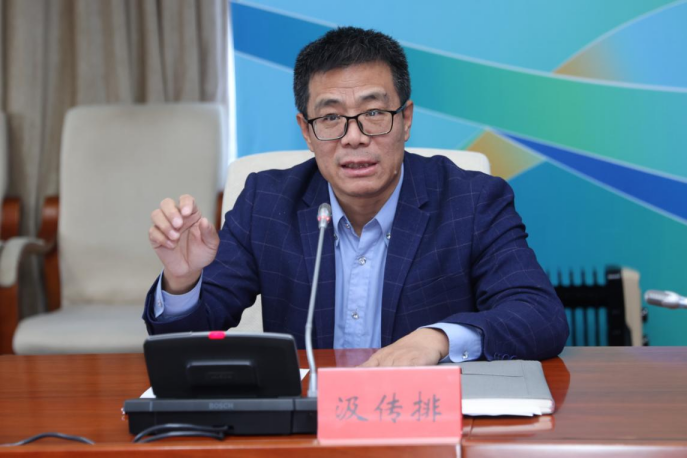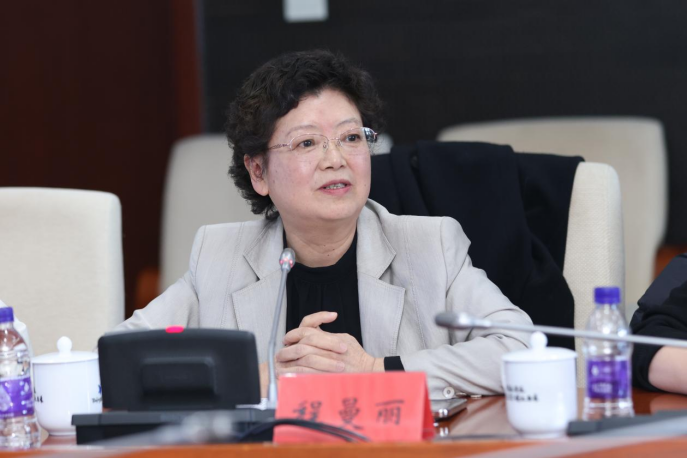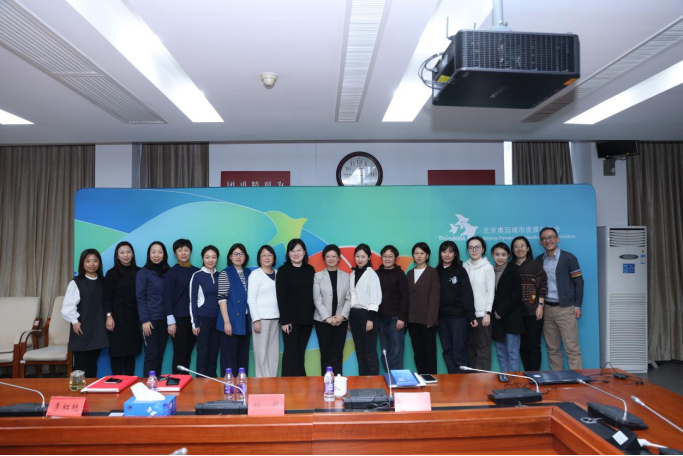On 29 November, the Beijing Olympic City Development Centre held the Beijing-Zhangjiakou Seminar on International Communication Capacity Building of Olympic Venues in Beijing. Communications managers of some Olympic venues in Beijing, Yanqing and Zhangjiakou zones of the Winter Olympic Games Beijing 2022 attended the meeting and introduced what their respective venue has done in international communication. Multiple experts attended the seminar and put forward recommendations on how venues could strengthen international communication. They were Cheng Manli, Director of the Institute of International and Strategic Studies (IISS) at Peking University and professor and doctoral supervisor at the School of Journalism and Communication of Peking University; Zhang Shaowei, Director of Overseas Media of the Media Centre of China Daily; and Hu Yue, Deputy Director of the Converged Media Centre of the Centre for Western European and African Communications of China International Communications Group. Ji Chuanpai, a member of the Party Leadership Group and Deputy Director of the Beijing Olympic City Development Centre, presided over the seminar and delivered a speech.
Ji Chuanpai pointed out that international communication regarding the Olympic legacy holds particular relevance, as it is an important part of the endeavour to present the international community the fruitful outcomes of Beijing as the first city and only city to have hosted the Summer and Winter Olympics, as well as China’s phenomenal achievements in the new era. He called on the experts to offer their insights and suggestions and the venues to provide valuable clues and materials and collaborate with Olympic city development associations to tell China’s story and the Beijing chapter of the Olympics.

(Ji Chuanpai delivers a speech)
Cheng Manli said that for venues, international communication should not be limited to annual plans or short-term plans over two or three years, nor should it be limited to partial plans of a single venue. Instead, a collaborative and integrated approach should be taken. Under unified top-level strategy design, all venues should work together in a coordinated manner, aligning their long-term international communication efforts with the broader goal of national image building and with the country’s development and communication strategy. A systemic and integrated approach to thinking is needed to spur institutional innovation. She proposed several recommendations from the perspective of communication principles and requirements. First, as the communicators, Olympic city development associations should strengthen top-level design, integrate resources and facilitate information sharing. Second, the “dual Olympic city” of Beijing is China’s unique brand. In creating effective communication content, it should emphasise storytelling, underscore strategic planning and highlight distinctive features. Third, it is important to segment the audience and identify target groups. Fourth, the right communication channels should be chosen based on a thorough analysis of the target audience. Finally, evaluating the effect of communication is essential, and specialised agencies may be entrusted to do so.

(Cheng Manli speaks)
Zhang Shaowei said that Olympic venues have garnered wide attention on overseas social media platforms, with predominantly positive feedback. This year, BODA established accounts on Facebook, X and LinkedIn, and have accumulated nearly 100,000 followers in just a year. Several posts have gone viral, each reaching over a million views. This clearly demonstrates that the topic of Olympic legacy is of great interest to an international audience. She put forward the following recommendations. First, efforts should be made to build iconic Olympic venues like the Bird’s Nest, the Water Cube and the Ice Ribbon into a symbol of Chinese culture in the new era. Second, in the process of communication, we need to tell true stories and convey the details, which is essential to building a credible, amicable and respectable image of China. Third, we should make good use of the user-generated content (UGC) library and pay attention to the interests of the overseas audience for secondary communication. Fourth, we should enhance cooperation with influential international organisations such as the International Olympic Committee to bolster our credibility. Fifth, we should ensure the sharing of promotional materials among venues, streamline internal information exchange and maximise the communication effect of existing materials. Sixth, we should take flexible approaches to promoting events and activities, while avoiding copyright infringement.

(Zhang Shaowei speaks)
Hu Yue introduced the businesses and features of China International Communications Group (CICG) in international communication. CICG is China’s first agency dedicated to international communication and has 21 subsidiaries and 26 overseas branches in 14 countries and regions. Annually, it publishes more than 1,000 books and periodicals in over 40 languages. Its publications are distributed in more than 180 countries and regions. Through years of practice, the agency under the Publicity Department of the CPC Central Committee has gained valuable experience and achieved notable results in analysing international public opinion, conducting international communication and assessing the communication methods and effects. CICG has three key features. The first is strong brand building to improve the international communication effectiveness, the second is project-based operations to achieve effective communication, and the third is diversified services to support international communication. She said that CICG is willing to help the venues enhance their international communication capacity.

(Hu Yue speaks)
According to the host, this seminar came as the Beijing-Tianjin-Hebei coordinated development celebrated its 10th anniversary as a national strategy and the third anniversary of the Beijing 2022 Games is approaching. Following President Xi Jinping’s instructions on the Beijing-Tianjin-Hebei coordinated development and the Beijing 2022 Games, the seminar focused on how to improve the international communication capacity of venues. Based on the outcomes of the seminar, BODA will establish mechanisms for previewing hot highlight events at venues, sharing promotional materials and regularly exchanging experience; increase the visibility of the venues on overseas social media platforms and help them expand communication channels, enhance the effect of communication and strengthen their influence. This will serve to advance the construction of the Beijing-Zhangjiakou Sport, Culture and Tourism Belt and the Beijing-Tianjin-Hebei coordinated development.
Those present at the seminar also included Shi Lei, Assistant to the General Manager of the National Stadium; Guo Lin, head of the Brand Creative Department of the National Aquatics Centre; Liu Jing, Manager of the Culture and Development Department of the National Stadium; Dong Chenming, deputy Party secretary and head of the labour union of National Speed Skating Stadium Management Co., Ltd.; Yuan Yinghui, Deputy General Manager of Wukesong Venue Operation Company; Bai Xue, head of the Brand Centre of the National Tennis Centre; Zhang Siyuan, Director of the Party and Mass Work Department of Beijing National Alpine Skiing Co., Ltd. in Yanqing Olympic Park (Winter Olympic Park); Li Hailu, Deputy Director of the Zhangjiakou Olympic City Development Centre; and Zhang Huiying, Director of the Party Committee Office and head of communication of Zhangjiakou Xingyuan Group. Representatives from the Beijing Olympic City Development Centre included Director Li Hongyan and Deputy Director Liu Nan of the Development Research Department and Director Wang Cheng and Deputy Director Qi Xuan of the Media and Communications Department.

(A group photo at the seminar)

© Copyright 2020. All rights reserved
Beijing Olympic City Development Association.All rights reserved.Beijing ICP 11016671 No.